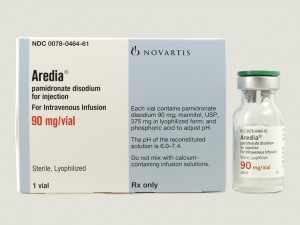Aredia Side Effects
Aredia may cause rare but
serious adverse side effects. If you experience any of the following symptoms while taking Aredia, contact your doctor:
- Painful aching of joints, muscles or bone; pain, numbness or swelling of the jaw
- Allergic reaction: hives, trouble breathing, or swelling of the tongue, face or throat
- Fever or flu-like symptoms, paleness, easy bruising and increased bleeding
- Abnormal urination including less frequent or no urination, pain while urinating, or trouble urinating
- Inflammation or rapid weight gain

- Changes in vision, soreness of the eyes, or unusual sensitivity to light
- Abnormal thoughts or conduct such as confusion or hallucinations
- Seizures (convulsions) which may be cause by unusual brain activity
- Irregular heart rate, feeling dehydrated or thirsty, increase in urination, decline in muscle strength, or aching of the legs
Common,
less serious side effects while using Aredia include:
- Stomach aches, nausea, vomiting, heartburn or decrease in appetite
- Irregular bowel movements leading to diarrhea or constipation
- Faintness or drowsiness
- Red swelling underneath the skin at the location of the injection site of the IV
- A continuous pain in the head
- Allergy symptoms: runny or stuffy nose, and/or coughing
- Mild back pain or joint aching
Warnings & Recalls for Aredia
As of May 2005, the
U.S. Food and Drug Administration revised prescribing information on Aredia to include a more detailed description of side-effects which may lead to
osteonocrosis in patients with cancer. The FDA recommends that patients receive a dental examination by dental healthcare professionals before taking any
bisphosphonates including
Aredia.
Aredia is listed under the FDA
Category D as it can injure an unborn baby.
Do not take Aredia if you are breast-feeding as it may cause harm to a baby during nursing. Scientists are unsure if Aredia may be passed from the breast-milk to the baby. Let your doctor if you are pregnant, may become pregnant, or are breast-feeding before beginning bisphosphonic therapy.
Before taking Aredia, let your doctor know if you have:
- Kidney disease
- Had thyroid surgery
- Taken thylidomide in treating bone marrow cancer
- Used steriods
- Been treated by methods of radiation
Do not take Aredia if you are allergic to pamidronate or other bisphosphonates.
Aredia Treatment and Use
Aredia | Pamidronate Disodium, Zometa is an intravenous or IV therapy bisphosphonate marketed by Novaris. Aredia is used to fortify bone, which may have been damaged due to cancers and other diseases including:
In many cases, Aredia may be given to patients during or after cancer treatments and chemotherapy to aid in reducing the symptoms of cancer.
Aredia is also commonly used in treating and preventing osteoporosis among patients.
How does Aredia work?
Aredia modifies the cycle of bone development and breakdown. In the body, cells called osteoclasts create new bone and remove old bone in the body. Through the use of bisphosphonates, Aredia coats the bone and controls the osteoclasts. This prohibits from bones from being further damaged and allows the remaining bone to strengthen.
Aredia Dosage Information
Aredia is a specialty pharmaceutical injected into the vein by a doctor or nurse at a clinic or hospital. This medicine is given through an IV during a process which may take between 2 and 24 hours. After receiving proper instruction, your doctor may prescribe this medication for self-injection at home. Do not take this medication at home if you do not fully understand how to use it or how to dispose of the materials after the procedure.
Since Aredia is used to treat different illnesses, it may be prescribed in several ways:
- As a single dose, one time
- As a single dose repeated three days
- Or given once between 3 and 4 weeks
Aredia may be mixed with a liquid or diluted in an IV bag. To ensure your safety, do not mix Aredia with any liquid containing calcium or other drugs in the IV bag. You may store the solution for 24 hours in the fridge. However, if the solution changes color or contains particles it should no longer be used. Dispose of used needles in a puncture-proof container.
Doctors commonly prescribe Calcium and Vitamin D supplements by mouth to aid in the process if you do not have hypercalcemia.

